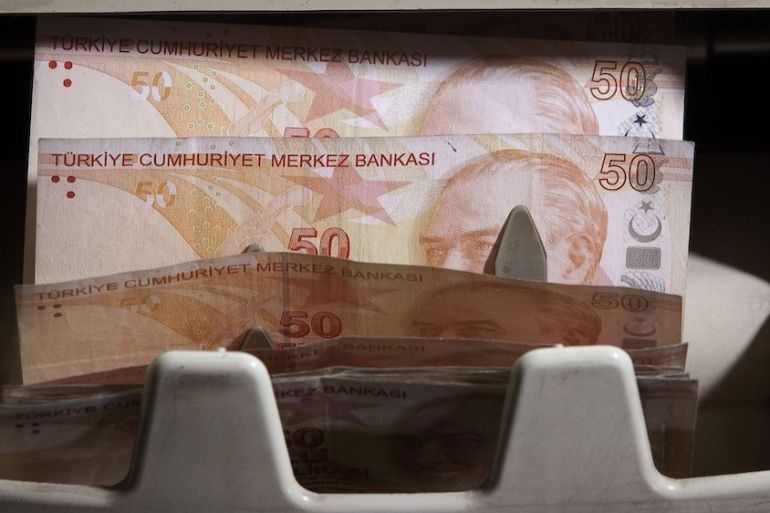Turkish lira claws back from record low as policy decision looms
Though analysts say formal rate hike is unlikely, back-door tightening moves have helped shore up beleaguered lira.

Turkey’s lira rebounded from an all-time low on Wednesday, a day before the central bank is expected to take more back-door steps to rein in credit, though a formal rate hike remains a less likely option to support the sagging currency.
A series of back-door tightening moves has lifted average funding costs above the central bank’s main policy rate, set at 8.25 percent. The latest was a halving of interbank borrowing limits in money markets.
Keep reading
list of 4 itemsTurkish opposition wins major cities in local elections
What shapes Turkey’s municipal elections?
Turkey offers to host Russia-Ukraine peace talks as Erdogan hosts Zelenskyy
Analysts say the steps have taken some pressure off of the currency and signalled that a formal monetary tightening is not in the cards at a policy meeting on Thursday, especially given political pressure to maintain monetary stimulus to help businesses and households cope with the economic fallout of the coronavirus pandemic.
Only five of 16 economists polled by Reuters expect a rate hike.
“For me, it’s still probably a little bit below 50 percent that they raise the policy rate,” said Blaise Antin, head of emerging markets sovereign research at Los Angeles-based investment firm TCW.
“While Turkey is likely to end up with an IMF programme eventually, it probably won’t happen until they instil more pain,” he said of funding from the International Monetary Fund, an option President Recep Tayyip Erdogan has rejected.
“The situation has to get bad enough that Erdogan is willing to make that pivot, [which would begin] with a rate hike,” Antin added.
Central bank stretched
The lira was up one percent at 7.31 against the dollar, still close to a record low of 7.4 touched on Tuesday. It has lost nearly 20 percent of its value this year, among the worst performers globally.
Istanbul’s main stock index jumped 2.2 percent, driven by energy companies, after Erdogan said during an industry event that “good news” was due to be announced on Friday, but gave little detail.
The lira has been hammered in recent weeks by concerns over costly state interventions in foreign exchange markets and Turks’ demand for hard currencies, which is at a record high.
The central bank has been stretched thin in Turkey’s response to the pandemic and its gross reserves have fallen below $47bn from $81bn this year. On Wednesday it conducted a repo at an average rate of 11.27 percent.
One banker said the central bank is responding to recent comments by Finance Minister Berat Albayrak, who stressed the importance of a competitive currency.
“We think the aim is to prevent sudden and new losses in value from levels identified as being competitive,” the banker said. “I think the steps being taken currently are about building confidence and presenting a lira yield which will stop locals moving into foreign currency.”
The move to reduce liquidity limits at the overnight lending rate of 9.75 percent could suggest the central bank will switch to funding through its late liquidity window rate, which at 11.25 percent is the highest in the policy corridor, although still below Turkey’s 11.76 percent annual inflation.